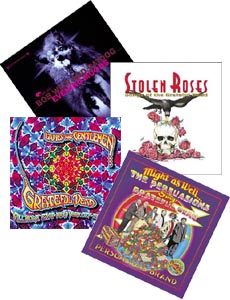![[MetroActive Music]](/music/gifs/music468.gif)
[ Music Index | Santa Cruz Week | MetroActive Central | Archives ]
Déjà Vu All Over Again
A flashback with the Grateful Dead on new cover albums and tribute collections
By Scott Cooper
EVERYBODY WANTS to be the Dead, but nobody wants to die. Look at Bob Weir for example. The Dead's guitarist comes out with his first studio record since the Reagan years and tries both to capture the essence of the Dead and evolve past it, but in trying so, he accomplishes neither.
Evening Moods (Grateful Dead Recordings) lacks the Dead's imaginative and melodic wanderings, though it wanders plenty. Guitarist Mark Karan (from the Other Ones) fills spacey jams with tasteful riffs, but the music never seems to go anywhere.
And neither do the songs. These is clearly Weir's worst batch of material since When the Beat Meets the Street was frowned upon in the early '80s. Still, some of these songs would have worked better with the Dead than some of Weir's songs he did perform with the Dead in the '90s, particularly the Dead tunes "Eternity" or "Banyan Tree."
A cappella experts the Persuasions take a better stab at the Dead on their new release, Might as Well: The Persuasions Sing Grateful Dead (Grateful Dead Recordings). Garcia-Hunter tunes like "Lazy River Road" and "Ship of Fools" are passed through a filter of soul and come out the other end sounding closer to gospel music than psychedelia.
Of course, no Baptist preacher ever sang about the sexual proclivity of "Loose Lucy" or "Sugaree." Anyone who has appreciated the Dead's music but couldn't handle their loose yet close-enough-for-an-acid-trip vocal harmonies can find redemption herein.
Another new disc with fine vocal harmonies is Stolen Roses: Songs of the Grateful Dead (Arista). Exactly why we need another tribute disc, of various artists covering Dead tunes is up for debate, but like Deadicated, the first Dead tribute disc from 1991, this collection serves up some tasty gems and some bitter leftovers.
Wartime, featuring Henry Rollins, mangles "Franklin's Tower" almost as much as the Sex Mob tears apart "Ripple." On the positive side, David Grisman's instrumental version of "Dark Star" lives up to Grisman's high standards, and the Cache Valley Drifters' traditional bluegrass take on "Cumberland Blues" is one of the best tracks. Bob Dylan's bootleg-quality recording of "Friend of the Devil" is included for little more than star power.
AND THEN there's the Dead themselves. Making a valiant effort to capitalize on the still-fresh buzz of the band, Grateful Dead Recordings releases live archive recordings every few months. This year alone, we've seen four from the Dick's Picks series. In retort to those who never understand why Deadheads collect so many recordings, Volumes 16, 17, 18 and 19 are clear snapshots of different eras of the Dead's existence, complete with different songs, different personnel and different tones.
Volume 16, with material from 1969, captures the Dead's wild and youthful enthusiasm with obscurities like "Easy Wind," "The Eleven" and "Caution." Volume 17 jumps forward to 1991, when Bruce Hornsby shared keyboard duties with Vince Welnick. Though the album is an accurate depiction of a distinct period of the Dead, it's also arguably the worst of the Dick's Picks series.
By contrast, Volume 18, from 1978, is one of the best. The jams discovered new and uncharted territory, the sound was big and full and the songs borrowed from the old repertoire and introduced the new. The version of "Estimated Prophet" that starts disc two is worth the price alone.
The most recent Dick's Pick, Volume 19, from 1973, is a mixed bag of pedestrian run-throughs and energetic standouts, including great versions of "Don't Ease Me In" and "They Love Each Other."
But the best of them all is a new four-disc set from Arista called Ladies and Gentlemen: The Grateful Dead. Recorded at the Fillmore East in 1971, the show captures a unique and excellent stage in the Dead's evolution. Organist, harmonica player and blues singer Pig Pen leads the band through epic versions of "Hard to Handle," "Good Lovin'" and "Alligator."
While they still sounded like the hyped-up '60s band, the Dead were at this point starting to morph into a roots-Americana combo with twangy versions of "Ripple," "Casey Jones" "Cumberland Blues" and even Merle Haggard's prison lament "Sing Me Back Home."
If all these live Dead releases don't satisfy your Garcia jones, dig through the CD bins and discover the recent release by Paul Pena, New Train (Hybrid). You may recognize Pena's name as the blind blues singer from the movie Genghis Blues or the guy who wrote Steve Miller's hit "Jet Airliner."
Recorded in 1973 but not released until this year, these sessions were another one of Garcia's studio jobs as a pedal-steel player. Though it wasn't Garcia's best work, or a great record for that matter, it's a rarity to be sought after by collectors.
In this post-Garcia zeitgeist, collectors are no longer stocking up on tapes but rather snatching up CDs. Credit the Dead's business alter-ego to realize that the same transformation will likely take place with online digital recordings. In the meantime, their motto seems to be "sell, sell, sell while the sellin's good."
Copyright © Metro Publishing Inc. Maintained by Boulevards New Media.
![]()

From the November 29-December 6, 2000 issue of Metro Santa Cruz.